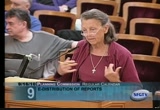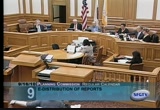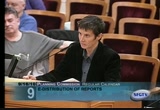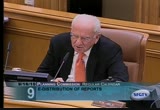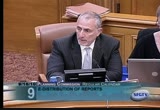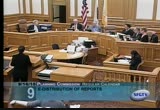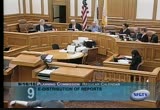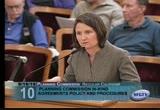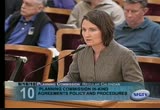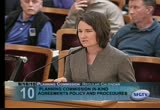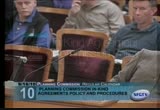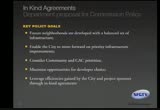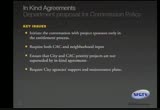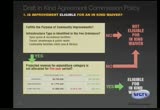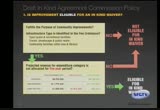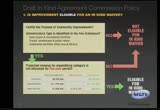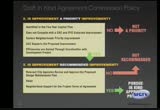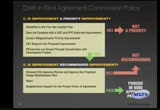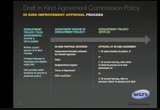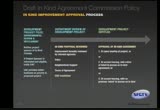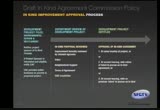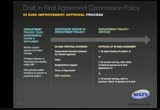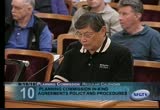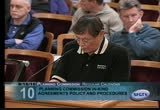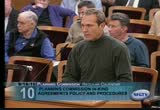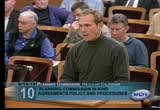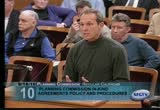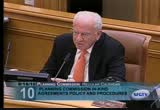tv [untitled] September 17, 2010 8:30pm-9:00pm PST
9:30 pm
and tab for differences so you have an understanding of how the iterations are changing or evolving. and they did talk about the three boxes of market octavia. yes, with all the iterations that came forward on that, it would stack over 6 feet high. the reason you are having maybe more use of paper is that planning is accelerated with the veteran neighborhood program in the executive summary on the second page, it states here that 66% of the paper the city uses is recyclable and that is in ships and recycled papers. the development itself makes for a lot of woodchips, doesn't it, and a lot of free destruction, so we ended up with 33% that comes from whole trees and certainly could be much more that comes from recycled paper
9:31 pm
and woodchip. and as other people have testified, yes, there will be a lot more use of paper when people don't know what they want really and download everything. when i go into planning department, i like it better than internet use. i look at the materials on hand and see what pages i want conpies of and if i want the whole document, i request the whole document and there is a cost no more than one cent per page and planning still charges 10 cents per page. no more than one cent per page unless there's been a careful analysis done of the cost of rotation, ink, paper, the city gets paper very cheaply. the city doesn't pay for electricity. the city gets ink cheaply because they buy in volume. it is really important to have all of this material available and at the very least it should be available in the public file which is at planning department.
9:32 pm
it has not even been available in public file when the huge amount of materials came out for eastern neighborhoods, i had because it was not in public file for me to access and copy, i had to call ken rich and -- [bell ringing] >> and he got very aggravated and told me he would make it very hard for me to -- president miguel: thank you. view view this should not be done. thank you. president miguel: is there further public comment on this item? if not, public comment is closed. commissioner olague. vice president olague: i would like staff to clarify the cost i am hearing and those thing. >> the legislation itself doesn't -- it is silent on whether we would charge people, so there's no requirement that we have to charge people and no requirement that we have to make the materials available free. our current practices are to generally make -- to encourage e
9:33 pm
documents and if it's available, we print it out in advance and provide copies we have on hand. and for items such as environmental impact reports, those are provided currently free of charge and if the item has been approved as in the past, we do charge for the reproduction of those and same with the community planning documents. if we have items available, we get them out and if they're printed reports, there is a cost of the printing and the publisher and the fancy color and the things we print off using the photocopier, a rate of 10 cents per side in black and white and 25 cents per color and if it's a large color, the a cost is higher for a large piece of paper that's color printing.
9:34 pm
>> just to clarify t whole issue of economic hardship and we don't require any documentation. we simply go on faith in someone is suggesting we cannot aset a record to pay the price, we do provide free of charge. >> there is no questioning about staff. if someone says it is a hardship, it is provided. >> whey understand is a lot of the documents are currently printed out and upon request they are given or automatically given to certain members of the public? >> the e.i.r.'s are printed out and we have a good understanding about how many copies will be needed and if more are needed, we print out more and during the public comment they are all provide free of charge. >> in the future t requester
9:35 pm
would have to ask for a printed copy. >> we have many requests and we know they will ask again and i don't think it will be long. we're printing out the same advanced numbers. >> it would be better if they have to put a request on and keep it reproducing costs. >> we transmit them to the board of supervisors and required to be lodged with the board and electronic or hard copy and for every board member.
9:36 pm
and all the board members will get e-copy. i think that was the proi mare and that will change under adoption of this if it is adopted. >> i think it is correct that many members of the public will want hard copies and if they are easily available in electronic form, that members of the public will use them and many times they are interested in a certain part of the document. in the case of a project like that, we already have reduced the number of hard copies and are making them more easily available on cd's or something so people don't have to lug home a 1,000 page document. we will find over time as well that this will help and part is
9:37 pm
how we make the documents available. >> and with the document online as opposed to the lack of availability in hard copy and may satisfy some people who are happy with reading it that way. and so that's all right as long as the concerns you expressed today are answered. president miguel: we have a motion. >> move to approve. are there any additional amendments or recommendations? no? good. >> i would second as long as the approvals or comments are included with the approval as to the modifications and i think it's too complicated to have absolute amendments to this on all the different things we brought up. >> and maybe don't exactly
9:38 pm
relate to this. and wasn't sure if there was direction for the board. >> and -- >> i would like to have comments, but we don't have to include them. >> commissioners, i have heard there is motion for approval and while there was discussion, there is no real amendment. and on the motion for approval. >> aye. >> aye. >> aye. >> aye. >> thank you, commissioners. that motion passed unanimously. president miguel: we're going to take a 10-minute break.
9:39 pm
>> 2010.0767u. >> good afternoon, commissioners. i am here to talk about the policy and i want to spend a minute talking about how we have gone about creating a policy for in kind agreement compared to what they are with in-kind and you have a document in front of you in the spring talking about the martin development and the child care agreement that included an in-kind agreement to provide a child care center. part of that discussion was an acknowledgment that we really needed to have clear procedures and process for per suing future agreements and with market octavia, and balboa and rincon
9:40 pm
hill. and there is an option for the developer to provide a 10-minute improvement rather than pay the fee. and the legislation sort of is providing the framework for the policy. we're not changing anything outlined in that legislation. so generally what that legislation says is the department makes a recommendation to the commission and the commission makes the ultimate decision on whether to approve the in-kind agreement. that is the same. and what we're here to talk about is what work needs to be done to make a recommendation about an in-kind agreement and what kind of consideration we should stake as staff and in coordination with the cac's and the neighborhood. so in your packet, i want to point this out so while i'm talking, the last two pages include a pay tricks which is a helpful outreach tool for following what i am talking about with an outline of what is
9:41 pm
in the policy document and to ases what's happening and what we're talking about. a quick overview of the presentation and i know there are also a few community members here who helped work on the policy, so i wanted to get to public comment as soon as possible so they get a chance to talk. so that's the packet. and also, i wanted to talk a little bit about the process. since the spring, i went to the eastern neighborhoods in the market octavia cac three time. the first was to let them know we were working on this and get input on the kinds of things we want to cover in the policy. the second time i brought a draft to them. and we made amendments based on that and brought a final version. and in your packet they have a resolution of support from the eastern neighborhoods and the market octavia cac with recommendations for five small
9:42 pm
changes all together and those have been incorporated in the draft in front of you so we're clear on that. i worked with the department of public works and the department of park and rec and they will be ultimately overseeing the development of the infrastructure that we're talking about. their ideas are also incorporated into this policy. so this is sort of the overview. and there are a few key goals that we're trying to do here. and these sort of provided the framework for our discussions. and the main one i want to emphasize is to make sure that neighborhoods develop with a balanced set of infrastructure. when i walk through the policy, you will see there are mechanisms to make sure that in-kind agreements don't result in an overabundance of one kind of infrastructure with a deficit of the other. for example, streetscape
9:43 pm
improvements and child care centers are easy to see happen through in-kind agreements and we want to see those happen and so our policies and procedures talk to that issue. we also want to make sure that the work that the cac and the city is doing and you have heard about the the showplace open square planning process and with the market octavia circulation study and is moving forward on priority projects and want the in-kind agreements not to jeopardize the projects and that is in the policy as well. and also we want to make sure we're providing this opportunity to developers. so we want to take advantage of time when a developer providing the infrastructure reduces the overall cost and there are efficiencies to seeing the project and the infrastructure dl delivered at once, so we
9:44 pm
acknowledge that as a goal as well. there are a few key issues that came out developing this and working with the community members on this. one is we wanted to start this conversation early in the process of reviewing the development project and when they say i want to do a development project and are subject to impact fees t first notification which is the notice of the public department requirements and will include information there and ask them to initiate and when and if they decide to know they are interested in pursuing an in-kind agreement. and notify the p.a.c. to be on the radar and they can start the request and be involved in the process from the beginning. and so the policy also calls for
9:45 pm
including cac and neighborhood input, although those are two distinct interest groups. to protect the work of the cac and the city and the project we prioritize. and require that the city agencies that will be overseeing the improvements and department of parks and rec and t.p.w. are supportive of the projects and can maintain them. i will go quickly through the decision and making a recommendation to the commission about a proposal. there are four steps. the first step is the most rigid and the requirements for the first step and determining whether a proposal is eligible for an in-kind agreement. this is the only area if the proposal doesn't pass this test, it won't be brought before the commission. this is making sure whatever
9:46 pm
they are proposing is consistent with the legislation. that is does it fulfill the public improvement and the kind of infrastructure we identified in the plans. and generally this list came from the eastern neighborhoods. sorry, the ordinance, open space, transit, streetscape, and facilities and that is what is generally allowed but we would check the ordinance and an example of something that wouldn't pass this test would be proposing a new fire station, this fee program isn't supposed to cover fire stations so it would be ineligible. the third eligibility criteria is a little bit complicated so i'm going to spend a minute on it. every five years the department has to prort to the report and
9:47 pm
say we were going to spend a certain amount of the income generated on transportation and let's say we were going to spend 60% on transportation. we have to show in a five-year period that we've done that. this table over here gives you an example of eastern neighborhoods. i'm sorry, it's quite small. but what you can see there is we have not collected a lot of impact fees and we did provide an in-kind waiver for the child care center and basically spent all but $60,000 of the money we have over a five-year period for child care. and if the project wants to propose a child care center to us, we would say, unless it was less than $60 thousand dollars that it is ineligible because we have expended that money. if they propose open space, it would pass the tests or transportation. in six years the child care
9:48 pm
center or the child care category would reopen and we could then consider that kind of proposal. so just to be clear, this is step one and this is something that will be done by staff. once a project passes the three tests can go to the more explicit process with the cac and the neighborhoods. there are two big questions. is it a priority and is it recommended. and there are criteria set out in the policy about whether it's a priority. the key issues are, is it something that the plan calls for that both the cac and the city agencies really see as a short-term priority? as you can recall, the plans are 20-year plans and there are a number of infrastructure ideas in there. we don't have the funding for all of them. the cac's are working really hard to determine what their priorities are in the short term. the market octavia cac has a draft of that. that is what we would use to facilitate that and the eastern
9:49 pm
neighborhood cac has a resolution that came through the board. and those will continue to be refined. there's an annual process for updating and what the cac and the city see as the priorities for the planned area. also cac's support the idea of it being more efficient to deliver the good through in-kind as opposed to having the city build it it. and whether an improvement is recommended, it's really about what is that actual, and we all have this idea of open space and showplace square, but how does that park actually work? and is it something we can maintain? is it a good value for the amount of park we're going to get? all those questions come down to the recommendation level and the policy talks about ways to think through those items and what we would include in our staff report to you. so both the city agency review and approval and a clear value and we'll work with the department of real estate and the department of public works
9:50 pm
to think about that value and make sure it's fair for what the city could otherwise purchase. and then neighborhood support for the approval it. so that is if it's a new park and the cac makes it a priority, we want to make sure the neighborhood it also thinks it's a design. a project that passes those two pieces would be prepared for the approval process to come before the commission with the recommendation from staff and the cac. and it is two part that as soon as they are interested, we let them know that the department lets the cac know there is a proposal on the table. and they're supposed to get an initial temperature gauge feedback on whether the proposal is a priority and whether they have other ideas and also sort of ideas on how to do outreach
9:51 pm
around the infrastructure piece. and following that, the cac would have another hearing and other items on the agenda where they have the resolution. they could have multiple or just one, but at least one more where they live to pass a resolution that would be a recommendation to you on either whether they support it and whether it's a priority and whether it's recommended and any detailed thoughts they might have on the specific proposal. and ideally it would be brought before you in concert with the title project. so that is to say if they're coming for a c.u. for large lot development, we would see the parks proposal and do the in-kind waiver with the entitlement. but there could be instances, though, where the developer hasn't finalized the design of the park or we don't have a maintenance plan or still discussing what we think the
9:52 pm
actual value is, but they would like to get started on the review and we have created a second way for them to get their entitlements and fill out a declaration of an intent to pursue an in-kind agreement and at least talk to the cac or talk to the city agencies and show they have had a good faith conviction and the project and the park in this case is moving along but they are not quite ready for an in-kind agreement. in that case they'd have to come back to you when the details are finalized at a second hearing and they would have to get the in-kind agreement approved at the second hearing. that would enable them to go on with the buildling entitlements in the interim. the thinked option would be -- the third option would be if they think they're going to pay the fee and fill out a declaration of intent to pay the fee and through either the passage of a lot amount of time
9:53 pm
or dialogue with the community and an idea for an improvement comes up and they would have to start at the beginning of the process i just outlined but with just tim proouchlts and then -- but with just the improvements and come before you for approval of that piece. so there's three different kind of venues where projects would be presented before you. i think that's it. i wanted to spend more time talking about the process and i presented before this the to the cacs and often worked with the working group which was designated and from the market octavia and dan murphy and fernando ortiz and two of them are here for public comment and i am hear for any questions if you guys would like. thank you. president miguel: thank you. i only have one card on public comment.
9:54 pm
>> good afternoon. i am on the land use committee and i earlier committed a request for continue continuance on this item and was told i could not do it at the time. this letter is from cfsn and this is mainly because we're thinking that a citywide-type of policy and since it seems to address or mention cac's a number of times and there are many areas and most areas don't have a cac, so we're concerned that the neighborhood input has not been asked for. so this letter goes on to state, dear president miguel and commissioners, the coalition of
9:55 pm
responsible neighborhoods requests the planning commission for a continuance on this matter because of inadequate kovj and the coalition of neighborhoods and organization have over 40 neighborhood associations and was not contacted for their input. the policies and procedures may be satisfactory but the planning department must make outreach a priority when the board and city wide policy and procedures are considered. we have participated in every important citywide policy and procedure matters including most recently the 2004, 2009 housing elements and market octavia ---ing pshg nshg and eastern neighborhood p pn and cfsn believes outreach and notification are critical in a good government process. your truly, judy berkowitz, president, cfsn. thank you. president miguel: thank you. is there additional public comment on this item?
9:56 pm
>> gafrp, commissioner. -- good afternoon, commissioners. peter cohen and i chaired the committee and the working group level along with levitt and dan murphy who had to leave and fernando ortiz from the eastern neighborhood. we spent a lot of detailed time on this and overall it is a good policy and will be an experiment to see how it works and we went through self-iterations and you could only quibble over words and how well it will work and these are any own personal positions on the whole topic of in kind improvements and i was
9:57 pm
talking with dan murphy earlier and how that was baked into the eastern neighborhoods and market octavia and we were never talking about privately delivered in-kind improvement and the delivery system wasn't talked about much at all and the whole notion that private development should be contributing to public amenities that really complement the impact of new growth. and so it was a lot of debate about what the sensitivity was and the role of the advisory committee and talking about how it happened and a presumption that it would be happening through the public sector. this is a very new conversation and with the private sector and i have to chair with you that i am tentative of the policies
9:58 pm
that encourage that and i don't think that should be encouraged and should be a little bit more the exception than the rule. and we have a fairly elaborate process through our cac's of identifying priorities and of working with five-year capital plan and with the large geography and not in the self-interest of a private developer as dan admitted and it doesn't make sense to do it if it's not really in proximity to the project. it changes the calculus for when and where and how the public benefits to make sure these debates happen and that was critical to be a transparent dialogue at all levels and are
9:59 pm
making decisions and want to come back with the hearings. president miguel: is there additional public comment on this item? if not, public comment is closed. commissioner antonini. commissioner antonini: thanks. i have a few comment and then a few questions. i think your comment about balance is important and to make sure the in-kind improvements are balanced and there are efficiencies and quality that you will avail yourself of by having some of this done by in-kind rather than going through the city and just sometimes we're backlogged and you can get things done by people who are experts in doing these things at a better cost. my one concern is that this
57 Views
IN COLLECTIONS
SFGTV: San Francisco Government Television Television Archive
Television Archive  Television Archive News Search Service
Television Archive News Search Service 
Uploaded by TV Archive on

 Live Music Archive
Live Music Archive Librivox Free Audio
Librivox Free Audio Metropolitan Museum
Metropolitan Museum Cleveland Museum of Art
Cleveland Museum of Art Internet Arcade
Internet Arcade Console Living Room
Console Living Room Books to Borrow
Books to Borrow Open Library
Open Library TV News
TV News Understanding 9/11
Understanding 9/11